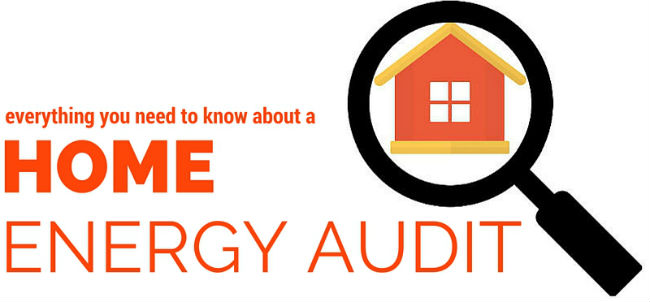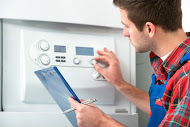Save Energy and Cut Your Energy Costs With a Home Energy Audit

So you're trying to save money on your bills by reducing your energy use. You've picked up some good habits - you're washing laundry in cold water, you've learnt how to use your air conditioning efficiently, and you've dealt with any energy vampires that might have been lurking in your home. But can you go farther? And what are the most cost-efficient changes you can make to cut your home energy consumption? What about the energy efficiency of your home?
A home energy audit can help you identify where your home is losing energy (and money), and help you make the most cost-efficient and worthwhile changes to improve the energy efficiency of your home.
What is a Home Energy Audit?
A home energy audit, also known sometimes as a home energy assessment, is an evaluation of the energy performance of your home. If you get it done professionally, it is performed by a specially-trained home energy advisor, who inspects your home in order to evaluate the heating and insulation characteristics. You can also do it yourself, though it won't be as thorough.
The purpose of a energy audit is to improve the energy efficiency of your home, by identifying where your home is losing energy. Having a home energy audit performed on your home is an important step towards optimizing your home's energy efficiency and ensuring you aren't wasting money on unnecessary heating and cooling.
Benefits of a Home Energy Audit
The benefits of a home energy audit include:
- Reduce energy bills and increase energy savings: making the changes identified in your home energy audit will allow you to reduce your energy use and the costs of running your home
- Improve the comfort of your home: identifying and fixing the drafts in your home will improve your comfort and health
- Increase the resale value of your home: reaching ENERGY STAR certification will prove the energy efficiency of your home, and will improve its marketability. Regardless of whether you have your home certified or not, reducing its energy costs will improve its overall value, as homeowners are increasingly concerned with energy efficiency.
- Reduce your environmental impact: cutting your energy use will also help reduce your carbon footprint
Types of Energy Audits
Professional Home Energy Audit

Choosing a professional home energy auditor to assess your home will ensure that you receive a detailed and accurate evaluation of your home's energy performance. Many local governments and utilities throughout the US offer rebates or even free energy assessments, so it's a good idea to check out whether anything is offered in your area.
A home energy auditor will examine the performance of your home's heating, insulation and air leakage, hot water, and ventilation systems, and will offer appropriate (cost-effective) energy efficiency improvements and upgrades. He/She will do a room-by-room examination of your home, as well as a detailed examination of past energy bills. Your home energy auditor may also perform a home blower test. After the evaluation, he/she will provide you with a written report of the results of the home energy audit.
A professional home energy audit likely includes the following steps:
- Interview: The home energy auditor will likely start by conducting a brief interview with you, in order to learn more about how the home operates and about any problems the home may have
- Bill analysis: Then he/she will likely ask to look through the past year's electricity and/or natural gas bills to determine base energy consumption of the home
- Walk-through assessment: The home energy auditor will then conduct a room-by-room walk-through assessment of your home in order to gather necessary information for evaluating its efficiency. First, he/she will take some measurements and pictures of your home from the outside. Then the auditor will look at your furnace and basement, and will examine the age and performance of your furnace and water heater, as well as the level and quality of insulation in your basement. He/she will also look at other appliances throughout the house, such as the toilets, kitchen appliances, lighting, etc. The auditor will also examine your attic, and in particular how well-insulated it is.
- Blower test: Having examined the house from basement to roof, the the home energy auditor will detect any drafts ("air infiltration"). This is often done by a "blower door test", in which the advisor will hook up a fan in the house to put it under reverse pressure. This test allows the advisor to find the exact points in your home where sealing is needed (areas where there are significant air leaks). The blower door test equipment is specially designed to fit into any exterior door opening. It includes a variable-speed fan that is mounted on a n adjustable panel. When turned on, the fan draws air through your home at a constant speed so that it reaches a certain (constant) pressure. This allows the advisor to measure how much leakage takes place within your home, and identify where drafts exist.
- Home Energy Assessment Report: Once the inspection has been completed, the home energy auditor will create a report that breaks down how much energy your home uses for space and water heating, lighting and other appliances, and identifies where in your home energy is lost (windows, doors, basement, attic, etc). He/she will explain the results of the report to you, and will answer any questions you might have. The report will identify which energy upgrades would be the most cost-effective.
Professional Energy Audit Checklist
Here's what you need to prepare for a home energy audit
- If you decide to go with a professional, check to see if there are any rebates offered by your utility or local government.
- Find a certified professional auditor. Your local utility may have a list of certified home energy auditors, or check the Residential Energy Services Network for a directory of certified auditors near you. Check to make sure that they use a calibrated blower door and that they do thermographic inspections or contract another company to conduct one
- Make a list of any existing problems, such as condensation and uncomfortable or drafty rooms, before the home energy auditor visits your home
- Collect copies of your electricity and/or natural gas bills over the last year (contact your energy supplier and/or utility if you are missing copies)
Self Home Energy Audit
Performing a home energy audit yourself might be a good weekend project, if you've decided that you don't want to get a professional home energy auditor. While you will not be able to go into as much detail as a professional auditor, you will likely be able to at least identify some of the easier areas to address in improving your home's energy efficiency. To help get you started, here is a checklist of how to assess your home's energy efficiency.
- Locate (and seal) air leaks: Make a list of places in your home where you already know there are drafts. Seal all identified drafts with appropriate materials, such as caulk. Then, check for and seal any other possible draft locations, such as:
- Interior wall joints
- Seals on doors & window frames
- Bottom edges of doors
- Air conditioner
- Electrical points
- Exposed piping, electrical, or telephone lines
Check the US Department of Energy for more advice on detecting air leaks
- Check ventilation: drafts can actually be a good thing in warmer climates, as they can help with cooling. Ventilation is important for your health, and for the upkeep of your home. Contact your utility, or a ventilation professional for more information if you need it
- Check the insulation in your home: it's likely that your insulation is inadequate if you live in an older home. Places in your home to check for insulation include
- Ceiling and roof (and attic, if you have one). Check for any drafts and/or gaps near any pipes, ductwork, or chimneys. Make sure that there is a vapor barrier under the attic insulation, and that the attic vents aren't blocked by insulation
- Wall insulation. While only a thermographic inspection will be able to tell you if the entire wall has been insulated, you can check for insulation by making a small hole in the wall (such as in the closet or behind a couch) to see if the wall cavity is filled with anything.
- Floor insulation. Check if there is insulation in your floor if the basement or crawlspace is unconditioned. You should probably insulate the basement/crawlspace if it is enclosed and contains air ducts, plumbing, or heating/cooling appliances and is enclosed.
- Inspect heating/cooling equipment: check to make sure that your furnaces/air conditioners are in working order. Clean and/or replace any filters, and consider bringing in a professional to perform a maintenance check. If your equipment is more than 15 years old, consider replacing it with a new, energy-efficient model (go for ENERGY STAR if possible), which will have much lower operating costs.
- Lighting: according to the US Department of Energy, lighting can account for about 10 percent of your electricity bill. Consider replacing old lightbulbs with energy efficient LED or CFL bulbs. Check to see if your utility offers any rebates on energy-efficient bulb replacements
- Appliances & electronics: try to estimate how much energy your appliances and electronics use, based on your habits, to see whether it is worth replacing them with more energy-efficient models. If you haven't already done so, eliminate any power vampires by unplugging electronics that aren't often in use, and/or using power strips for multiple devices.
Other ways to save on your energy bills
Once you've made the changes based on your home energy audit, your monthly energy costs should decrease considerably. If you're still looking for more ways to save, why not take a look at how much you pay for your energy itself? Depending on where you live in the US, you may have a choice of your energy supplier. Alternate suppliers offer you a wider range of options, with the possibility to save money on your fuel costs.
For more information about the best rates available in your area, call us at phone currently not available
